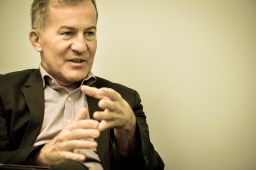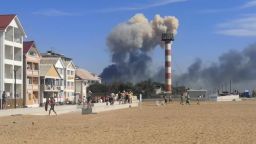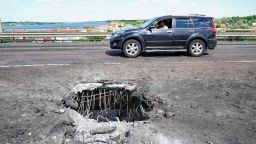Editor’s Note: Michael Bociurkiw (@WorldAffairsPro) is a global affairs analyst. He is a senior fellow at the Atlantic Council, and a regular contributor to CNN Opinion. The opinions expressed in this commentary are his own. View more opinion at CNN.
ODESA – When Russia invaded on Feb. 24, it immediately triggered a surge of patriotism in Ukraine that included a push for people to make more use of the nation’s official language: Ukrainian.
Signs quickly began appearing around the western city of Lviv, a stronghold of Ukrainian patriotism, urging citizens to drop Russian, the “language of the occupier.”

Ukrainian language proponents were emboldened by a story that went viral about Max, an abandoned Russian army dog who was reportedly adopted by Ukraine soldiers and learned Ukrainian commands within a month.
Max’s story was used by some TikTok users to chide their compatriots from the predominantly Russian-speaking eastern and southern regions of Ukraine who have migrated to the west in huge numbers but say they find it tough to learn the country’s official language. In turn, displaced easterners vented online about being greeted in cities like Lviv with demands to speak Ukrainian only.
Since the war began almost six months ago, Russian President Vladimir Putin has aimed to eradicate pretty much all traces of the Ukrainian identity. But if he expected that the full-scale invasion would divide Ukrainians along language lines, that simply hasn’t happened.
For context, Ukrainian and Russian are from the same Slavic language grouping. But Ukrainian comes across as more melodic, and some Ukrainian letters are not used in Russian and vice versa.
Sure, the language issue has promoted some heated debates, but the discussion has remained mostly cordial. At a tiny craft beer hangout in Lviv one recent evening, a loud discussion among college-aged students over the use of Russian ended with the singing of patriotic Ukrainian songs.
If anything, at least from what I have observed in my visits to major cities in recent months, the new sense of patriotism has created a “we are all in this together” sense of resolve, blurring the language divide. While Putin presses the narrative that the Ukrainian people are not ethnically distinct from their Russian neighbors, people here are taking steps to prove the opposite.
They’re learning Ukrainian, sharing nationalistic slogans and songs on social media, and proudly hoisting their country’s distinctive blue and yellow flag. In fact, every second building in Odesa seems to have a Ukrainian flag spray painted onto exterior walls, something locals tell me is new since the war began.
But for good reason, this issue has become a big part of the conversation about war and identity – especially with Putin saying his invasion was justified in order to defend Russian speakers under attack in Ukraine.
History repeating itself
Decades after the end of Soviet state policy to eradicate Ukrainian nationalism and language, history seems to be repeating itself as the Russian Armed Forces and their proxies occupy more land.
The playbook includes restrictions on the Ukrainian language or access to Ukrainian media and online sites – through such tactics as changing school curriculums to align with pro-Russian narratives, switching street signs to Russian, blocking sites like Google, substituting Ukrainian media with their own state-controlled channels, replacing Ukrainian mobile operators with Russian ones and moving residents who have become trapped in occupied areas onto Russian internet services where all western platforms are blocked.
The Kremlin has also forcibly deported at least 1 million Ukrainians into Russia – many through so-called filtration centers – triggering memories from Soviet times of Ukrainian dissidents sent to labor camps in the Gulag.
Even Putin’s efforts to weaponize food – stealing Ukrainian grain, deliberately shelling farmland and blockading agricultural products from leaving Ukrainian ports in the Black Sea – is reminiscent of what Stalin did in 1932-33. That’s when he tried to break the will of the Ukrainian people by triggering a great famine, known as the Holodomor, during which millions of Ukrainians died of starvation in the very land that was so fertile that it was called the “breadbasket of Europe.”
Mother tongue
On the issue of language in Ukraine, there is little consensus of what meets the bar in terms of proper usage. There’s a hybrid form of Ukrainian called “Surzhyk” that is commonly heard in cities such as Kyiv. And tech geeks have taken to incorporating many English words – such as “agenda,” “cool” and “timeline” – into their daily Ukrainian conversation, Anna Pashynska, who’s building shelters for displaced Ukrainians, told me. Even my own supposedly fluent Ukrainian, with its Diaspora accent, is the subject of frequent ridicule in Kyiv.
At a recent reading at a trendy Odesa club, the language onstage switched seamlessly between Ukrainian and Russian. Even though this port city is predominantly Russian speaking, the star of the show, writer and actress Elena Andreychykova, read her works mostly in Ukrainian, even though Russian is her mother tongue.
The author of six books in Russian, she didn’t speak Ukrainian at home. But in 2019, she said, “I realized there’s no road backwards. Ukraine has to have its own language. Everything I do is now translated to or written in Ukrainian.” She told me this in a conversation earlier this month, as we sat in Odesa under the shadow of a statue of Catherine II, who helped found the city and expanded Russian power there.
It’s not difficult to understand why Russian remains the language of choice among so many Ukrainians. In a May 2019 survey, about a third of Ukrainians named Russian as their mother tongue. And last year, almost half of Ukrainians said in a survey that they have relatives across the border in Russia.
Even “Servant of the People,” the TV comedy series starring Volodymyr Zelensky, before he became president of Ukraine and which helped propel him to fame, was originally filmed in the Russian language.
But Ukrainians are making an effort to adapt. Many displaced people from Russian speaking regions have signed up for free Ukrainian language classes in Lviv. In Odesa, many residents told me that since the invasion they’ve voluntarily taken it upon themselves to speak Ukrainian.
Even with the cordiality in the language debate, it is fair to worry about potential challenges ahead. The school year is due to commence in a few weeks, for example. Will the children of displaced Russian-speaking families in the western regions of the country be treated on par with their Ukrainian-speaking classmates?
And with millions of Ukrainian women and children having fled the country, the opportunity for kids to speak Ukrainian in places like Poland – where hundreds of thousands are expected to enroll in Polish schools this fall – could be limited.
Get our free weekly newsletter
At least at home, amid Putin’s divisive tactics, disagreement over language shouldn’t be allowed to compromise the unprecedented unity and patriotism that’s surfaced since the February invasion. That will only feed into the Kremlin’s strategy to wipe the Ukrainian identity off the map.
Andreychykova seems to have some sensible advice: “Let’s fight the war first, then we can have a discussion about language. Most importantly, for the time being, people are all focused on finishing our fight for freedom.”






